Are you curious about gummy bears but need to know if they’re a healthy snack? Look no further! In this article, we’ll explore the origins of gummy bears, their essential ingredients, and the potential benefits and risks associated with including them in your diet. Whether you love the taste or want to make an informed decision about what you put in your body, keep reading to discover all you need to know about these delicious, chewy treats.
Key Takeaways
- Gummy bears are a popular candy that has been enjoyed for decades.
- They are made primarily from gelatin, sugar, and water, adding flavorings and colorings for taste and appearance.
- Gummy bears can be a source of quick energy and stress relief, but they also have a high sugar content and can contribute to tooth decay if consumed in excess.
- While not a healthy food, gummy bears can be tasty.
- Many alternative snacks, including fruit, nuts, and yogurt, offer a healthier nutritional profile.
Positive points
- Introduction to Gummy Bears: The article provides a comprehensive introduction to gummy bears, explaining their origin, ingredients, and appeal.
- Variety of Flavors: Gummy bears come in a wide range of flavors, and the article explores the diversity of taste options available.
- Kid-Friendly Snack: Gummy bears are popular among children, making them a family-friendly snack.
- Versatile Usage: The article discusses how gummy bears can be enjoyed as a standalone treat, used in recipes, or added to desserts, showcasing their versatility.
- Dietary Considerations: The article may address gummy bears suitable for different dietary preferences, including vegan or sugar-free options.
Negative points
- Lack of Nutritional Value: Gummy bears are often considered a sugary and low-nutrient snack, so the article may need to address their limited nutritional benefits.
- High Sugar Content: Gummy bears are typically high in sugar, which can be a concern for those watching their sugar intake or for individuals with health conditions like diabetes.
- Dental Health: The article might mention the potential harm to dental health due to gummy bears’ stickiness and sugar content.
- Artificial Ingredients: Some gummy bears contain artificial flavors and colors, which may not align with natural or organic food preferences.
- Potential Allergens: Some gummy bear brands may contain allergens like gelatin, which can concern individuals with allergies or dietary restrictions.
Neutral points
- Ingredients and Composition: The article could neutrally describe gummy bears’ common ingredients and composition, providing factual information without judgment.
- Popularity and Accessibility: Gummy bears are widely available and enjoyed by many, making them a popular and easily accessible snack.
- Occasional Treat: Gummy bears can be considered an occasional treat or indulgence for some, which the article could neutrally acknowledge.
- Cultural Significance: Gummy bears may hold cultural significance or nostalgic value for some individuals, which can be mentioned without taking a stance.
- Nutritional Labeling: Mentioning that gummy bear packaging typically includes nutritional information allows readers to make informed choices.
- Dietary Considerations: Acknowledging that gummy bears may not align with specific dietary preferences, such as vegan or gluten-free diets, without passing judgment.
The Origins of Gummy Bears
Did you know that gummy bears have been around for nearly a century? German candy maker Hans Riegel first created these chewy treats in 1922. Riegel, who founded Haribo, named the candy after his favorite animal, the bear, and added the “gummy” texture to create a unique treat that quickly became popular in Europe.
The essential ingredients of gummy bears include gelatin, sugar, glucose syrup, flavorings, and food coloring. The gelatin, which is derived from animal collagen, is what gives gummy bears their chewy texture.
Today, gummy bears are not only popular in Germany but also all over the world, with different flavors and shapes to suit everyone’s taste.
CBD gummies and gummy bears share a similar appearance and texture, as both are chewy, gelatin-based candies. However, the vital difference lies in their composition: CBD gummies contain cannabidiol extracted from hemp, while regular gummy bears do not have any CBD or cannabis compounds.
The Origins of Gummy Bears: Fun Fact
As per the Guinness World Records, the biggest gummy bear ever made was over five feet tall and weighed over 1,000 pounds! The big gummy bear was created by a US candy company in 2014 and had an incredible 32,000 calories.

Gummy Bears: A Tasty Delight
While gummy bears are undoubtedly a delicious snack, their nutritional value could be more impressive. A standard serving size of gummy bears (about 17 pieces) contains around 140 calories and 30 grams of sugar. This high sugar content can cause a spike in sugar levels, leading to energy crashes and cravings for more sweets.
However, gummy bears are not entirely devoid of any nutritional value. Some brands of gummy bears are enriched with vitamins, minerals, like vitamin C and zinc, which can support immune function. Additionally, some studies have suggested that the gelatin found in gummy bears may aid in joint health and improve skin elasticity.
In moderation, gummy bears can be a fun and tasty treat to include in your diet, especially if you have a sweet tooth. However, it is essential to be mindful of their sugar content and limit your intake accordingly. Consider enjoying them as an occasional indulgence rather than a daily snack.
Gummy bears have vitamin gummies, which contain various vitamins for our bodies.
Image source:
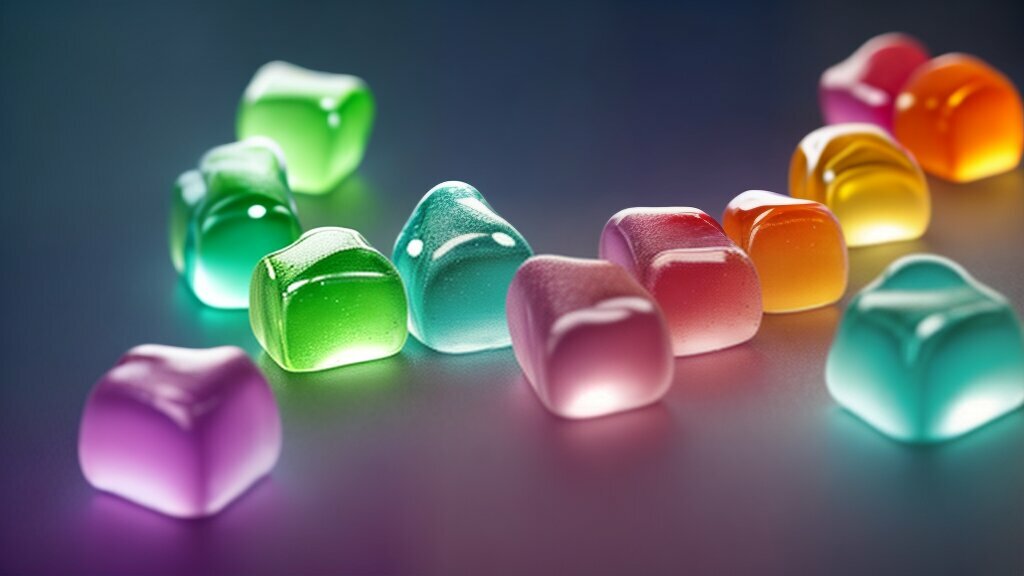
Gummy bears are undoubtedly a tasty treat that many people enjoy. However, as with any food, moderation is key. In this section, we will explore the potential benefits and risks associated with consuming gummy bears.
The Benefits of Gummy Bears
While gummy bears are not healthy, they offer some potential benefits. For example, thanks to their simple carbohydrates, gummy bears can provide a quick burst of energy. Additionally, some people find that eating gummy bears can help to ease their stress or anxiety levels.
The most significant benefit of gummy bears is their convenience. Their small size and portability make them easy snacks to enjoy at work, school, or traveling.
| Nutrition Facts | Amount per Serving (17 g) |
|---|---|
| Calories | 70 |
| Total Fat | 0 g |
| Sodium | 10 mg |
| Total Carbohydrates | 16 g |
| Sugars | 11 g |
| Protein | 1 g |
The Risks of Gummy Bears
While gummy bears can provide some benefits, they are not without risks. One of the biggest concerns with gummy bears is their high sugar content. Too much sugar can lead to sudden weight gain and a maximized risk of dental cavities. Additionally, gummy bears offer little in the way of nutrition. They are empty calories, providing little vitamins, minerals, or other nutrients needed to function correctly.
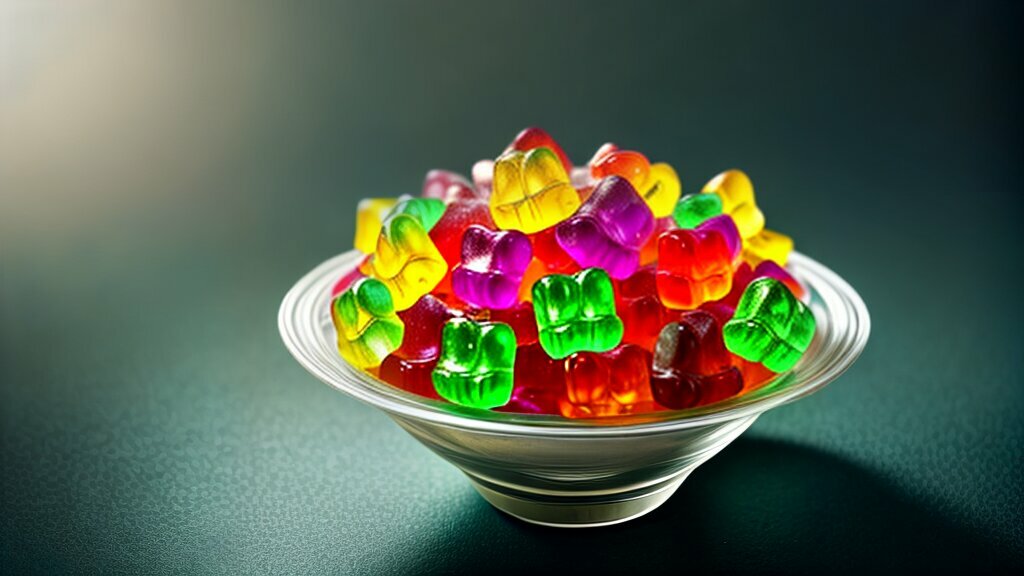
Whether or not you should indulge in gummy bears depends on your dietary preferences and health goals. There is likely little harm if you enjoy gummy bears and can consume them in moderation as part of an otherwise healthy diet. However, there are better options if you are looking for a snack with more significant nutritional value.
Whether or not gummy bears are a healthy snack depends on your dietary preferences and health goals. While they may be a fun treat occasionally, they are not considered a nutritious snack because of their high sugar content and lack of essential nutrients.
A serving of gummy bears typically contains around 140 calories and 22 grams of sugar, more than adults’ recommended daily sugar intake. However, if you have a sweet tooth and are looking for a small treat to satisfy your cravings, enjoying a serving of gummy bears, in fairness, is unlikely to harm your health.
Gummy bears may not be the best option if you are trying to maintain a good diet or lose weight. Instead, consider snacking on fresh fruits or vegetables, nuts, or low-sugar protein bars. These alternatives are more nutritious and can provide long-lasting energy throughout the day.
Ultimately, deciding whether gummy bears fit your healthy eating plan is up to you. Just be sure to consume them in moderation and balance them with other healthy food choices.
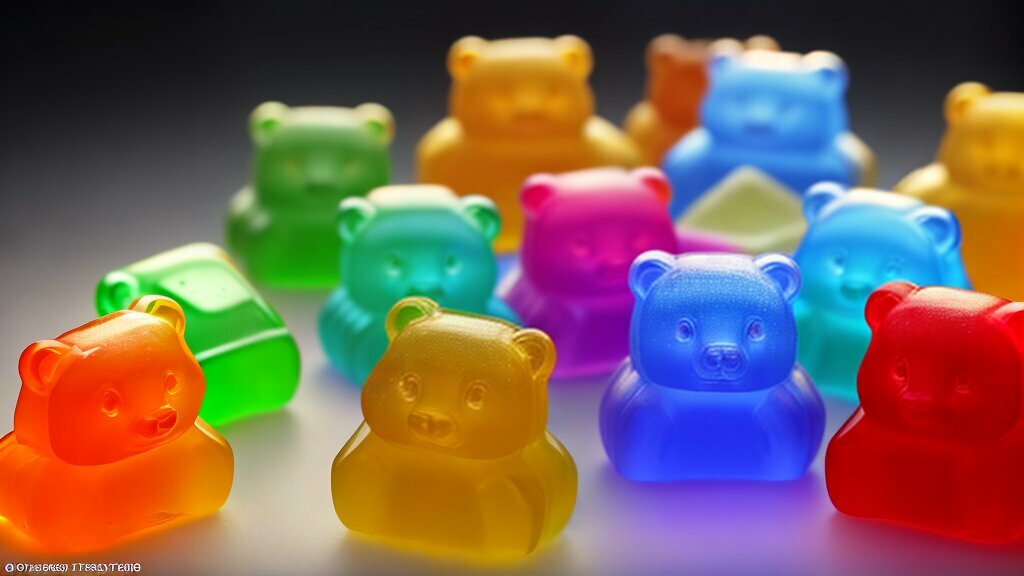
Alternatives to Gummy Bears
If you love gummy bears but want to try a more nutritious snack, there are many alternatives you can consider. Here are a few:
| Snacks | Description |
|---|---|
| Fruit Snacks | Many fruity snacks offer similar flavors and textures as gummy bears but with the added benefit of natural fruit juice and less sugar. Look for options with no added sugars or preservatives. |
| Dark Chocolate | Dark chocolate is a great alternative to satisfy your sweet tooth while providing antioxidants and other health benefits. Just make sure to choose a bar of high-quality chocolate with a high cacao percentage and minimal added sugars. |
| Trail Mix | If you want a sweet and savory snack, try a trail mix with nuts, seeds, and dried fruit. Look for opportunities with no added sugars or artificial preservatives. |

Remember, enjoying all snacks in moderation, whether gummy bears or alternative options, is essential. Incorporating various healthy foods into your diet will help you maintain a balanced lifestyle.
Gummy Bears and Weight Loss: Fact or Fiction?
There’s a widespread belief that gummy bears help with weight loss, but is there any truth to this? Unfortunately, the answer is no. While gummy bears may be low in fat and relatively low in calories, they are also high in sugar and lack essential nutrients that support weight loss.
One serving of gummy bears (about 17 pieces) contains roughly 140 calories and 21 grams of sugar. Unnecessary sugar can lead to weight gain and other major health issues, such as diabetes and cardiac disease. In addition, gummy bears lack the fiber and protein that help you feel full and satisfied, leading to overeating and potential weight gain.
While gummy bears may not be helpful for weight loss, there are plenty of tasty and nutritious alternatives. Consider swapping out gummy bears for fresh fruit, nuts, or low-fat yogurt. These options are rich in nutrients and low in sugar, making them healthier for weight management and overall health.
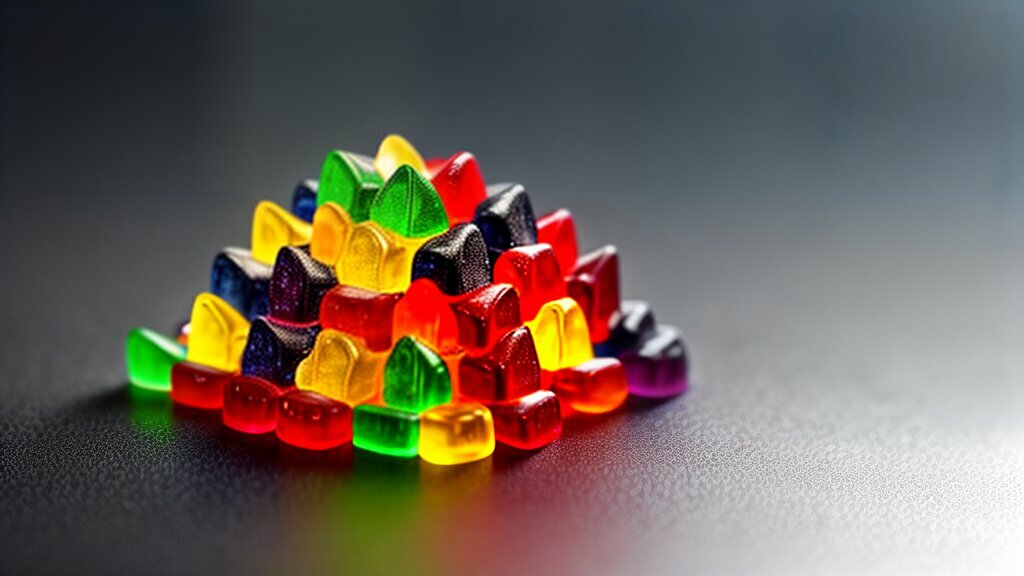
In conclusion, gummy bears should not be considered a weight loss tool. While they can be a fun and tasty treat in moderation, consuming too many gummy bears can adversely affect your weight and health. Focusing on a good diet and normal exercise is essential for long-term weight management and health.
Gummy Bears and Dental Health
If you have a sweet tooth, you may indulge in gummy bears occasionally. However, it would be best if you were made aware of the potential impact of these chewy treats on your dental health. Unfortunately, gummy bears are not tooth-friendly snacks.
The high sugar content in gummy bears is a significant concern for oral health. When we consume sugary foods, the bacteria in our mouth generate acid that attacks our tooth enamel. Over time, this can help with tooth decay and cavities. Gummy bears are especially problematic because they are sticky and adhere to your teeth, making it hard for saliva to wash away the sugar and acid.
To reduce the potential risk of tooth decay from gummy bears, it’s best to consume them in moderation. Brushing your teeth right after eating gummy bears can also help reduce the damage to your teeth. Alternatively, you can opt for sugar-free gummy bears or chewy snacks that contain less sugar and are less harmful to your teeth.
| Gummy Bears and Dental Health Do’s | Gummy Bears and Dental Health Don’ts |
|---|---|
| Brush your teeth after eating gummy bears. | Don’t snack on gummy bears throughout the day. |
| Choose sugar-free gummy bears. | Don’t eat gummy bears before bedtime. |
| Drink plenty of water while eating gummy bears. | Don’t substitute brushing your teeth with mouthwash. |
Remember, maintaining good oral hygiene is essential for overall health. While gummy bears may be tempting, they should be consumed in moderation. By practicing good dental habits and making smart food choices, you can enjoy a healthy smile and satisfy your sweet tooth.
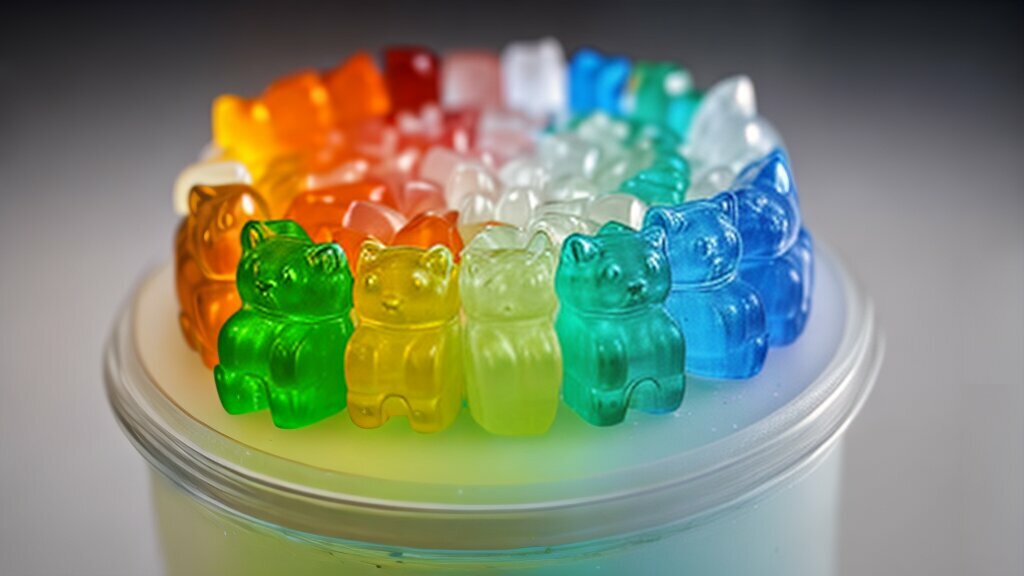
Conclusion
- Awareness of Sugar Content: Knowing their high sugar content and potential impact on dental health is essential.
- Moderation is Key: If you choose to incorporate gummy bears into your diet, do so sparingly and consider the overall nutritional value of your food choices.
- Oral Hygiene Matters: Maintaining good oral hygiene habits is essential when consuming sugary treats like gummy bears.
- Consultation with Healthcare Professional: Seek advice from a healthcare professional if you have specific dietary concerns or health goals.
- Alternatives to Explore: Consider exploring alternative snack options that may be healthier choices.
- Personal Preferences: Eating gummy bears or opting for healthier alternatives depends on your preferences and dietary goals.
- Informed Decision-Making: Make informed decisions about your snack choices, prioritizing your health and well-being.
Review 1
Title : Decoding Gummy Bears: A Balanced Guide to Enjoying These Iconic Treats.
User: Maria Elena
An informative guide, ‘What Are Gummy Bears? Should I Eat or Not?’ explores these iconic treats, showcasing their delicious taste and flavors. It emphasizes moderation due to high sugar content and dental concerns, offering a balanced view. The mention of consulting healthcare professionals adds credibility, making it a helpful resource for gummy bear enthusiasts.
Rating : 4.6/5
Review 2
Title : The Gummy Bear Dilemma: A Comprehensive Guide to Enjoying Delightful Treats with Moderation.
User: David Williams
What Are Gummy Bears? Should I Eat or Not? Your Tasty Guide!’ provides valuable insights for those intrigued by gummy bears. It delves into their delightful taste and diverse flavors, cautioning the need for moderation due to sugar content and dental considerations. Including advice to consult healthcare professionals adds credibility, making it an essential resource for gummy bear enthusiasts seeking a well-rounded view of this treat.
Rating: 4/5

Welcome to GummiesInfo.com, your go-to hub for all things gummy, curated by yours truly, Jimmy Chamberlin. With an unbridled passion for wellness and a relentless curiosity about gummies, I’m here to provide insightful guides that make your journey to better health both flavorful and enjoyable. My foray into health and wellness began as a mission to find practical, enjoyable ways to enhance well-being.
This odyssey led me to dive deep into the realm of gummies, exploring their benefits, ingredients, and impact on health. GummiesInfo.com stands apart through my hands-on approach. I won’t settle for superficial knowledge – I dig deep to uncover the finest gummy options. By scrutinizing ingredients, evaluating formulations, and conducting real-world tests, I’m here to guide you toward optimal choices. From gummy essentials to detailed health-specific insights like immunity, energy, and relaxation, GummiesInfo.com is your trusted companion. Join me in discovering the potential of gummies – together; we’ll journey towards wellness, one flavorful gummy at a time.
Yours in wellness,
Jimmy Chamberlin